Your cart is currently empty!
Tag: learn Japanese grammar
-
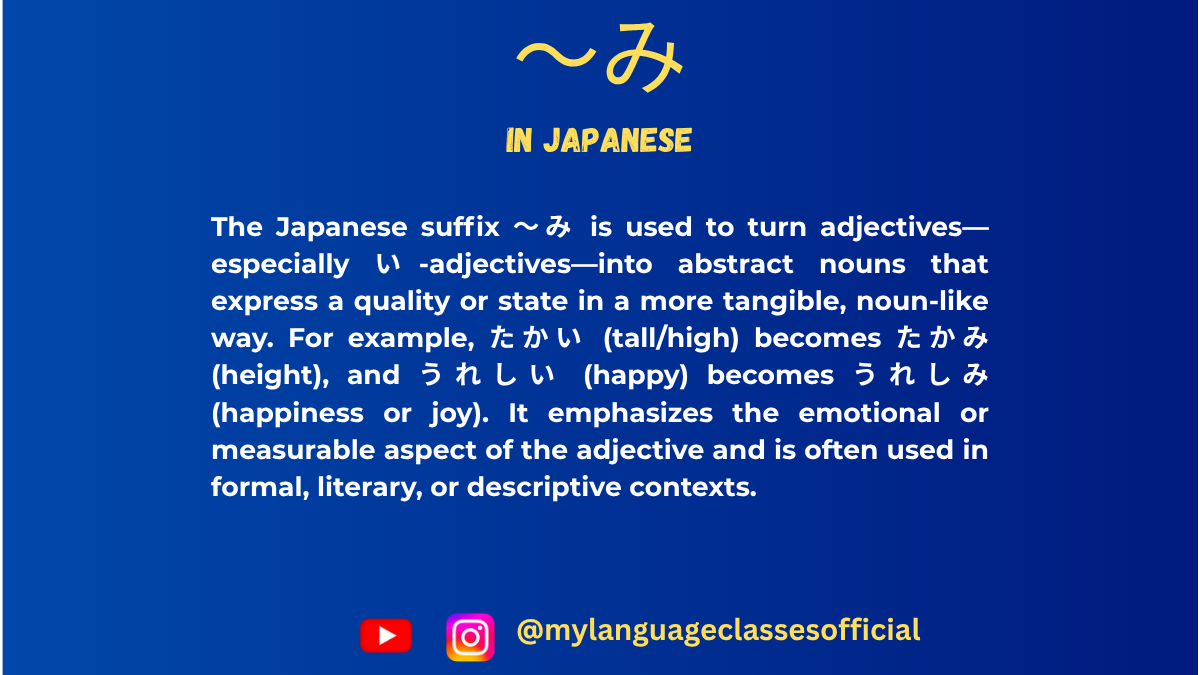
〜み: The Nominalizer for Adjectives/Verbs | My Language Classes
Understanding 〜み in Japanese
Japanese is a language rich in nuances, and one of its unique features is the use of nominalizers like 〜み. If you’ve ever wondered how to turn adjectives into nouns to express abstract qualities or feelings, 〜み is your go-to tool.
In this blog post, we’ll dive deep into the meaning, formation, and usage of 〜み, along with plenty of examples to help you master this essential grammar point.
What is 〜み?
〜み is a nominalizer used primarily with adjectives (and sometimes verbs) to turn them into nouns. It expresses an abstract quality, state, or feeling associated with the original word. For example, 甘い (amai, sweet) becomes 甘み (amami, sweetness), which refers to the quality of being sweet.
This form is commonly used in everyday Japanese to describe sensations, emotions, or characteristics. It’s a versatile tool that adds depth to your expressions.
Formation of 〜み
1. With Adjectives
To form 〜み with adjectives, remove the final い (if it’s an い-adjective) and add み.
Example:
- 甘い (amai, sweet) → 甘み (amami, sweetness)
- 痛い (itai, painful) → 痛み (itami, pain)
2. With Nouns
Some nouns can also take 〜み to express a related quality or state.
Example:
- 強さ (tsuyosa, strength) → 強み (tsuyomi, strong point)
- 深さ (fukasa, depth) → 深み (fukami, depth/richness)
3. With Verbs
While less common, some verbs can also take 〜み to express a resulting state or quality.
Example:
- 楽しむ (tanoshimu, to enjoy) → 楽しみ (tanoshimi, enjoyment)
- 悲しむ (kanashimu, to grieve) → 悲しみ (kanashimi, sadness)
Usage of 〜み
The 〜み form is used in various situations to describe abstract qualities, emotions, or states. Here are some common scenarios:
- Describing Sensations:
- 甘み (amami, sweetness)
- 苦み (nigami, bitterness)
- Expressing Emotions:
- 悲しみ (kanashimi, sadness)
- 楽しみ (tanoshimi, enjoyment)
- Highlighting Characteristics:
- 強み (tsuyomi, strong point)
- 弱み (yowami, weakness)
- Describing Physical States:
- 痛み (itami, pain)
- 重み (omomi, heaviness)
List of Verbs, Nouns, and Adjectives with 〜み Form
Original Word 〜み Form Example Sentence Romaji English Meaning 甘い (amai, sweet) 甘み (amami, sweetness) この果物は甘みがある。 Kono kudamono wa amami ga aru. This fruit has sweetness. 痛い (itai, painful) 痛み (itami, pain) 彼は痛みを感じた。 Kare wa itami o kanjita. He felt pain. 強い (tsuyoi, strong) 強み (tsuyomi, strong point) 彼の強みは忍耐力だ。 Kare no tsuyomi wa nintairyoku da. His strong point is patience. 深い (fukai, deep) 深み (fukami, depth) この話には深みがある。 Kono hanashi ni wa fukami ga aru. This story has depth. 悲しむ (kanashimu, to grieve) 悲しみ (kanashimi, sadness) 彼女の目には悲しみがあった。 Kanojo no me ni wa kanashimi ga atta. There was sadness in her eyes. 楽しむ (tanoshimu, to enjoy) 楽しみ (tanoshimi, enjoyment) 週末の旅行が楽しみだ。 Shuumatsu no ryokou ga tanoshimi da. I’m looking forward to the weekend trip.
More Example Sentences
- この料理は苦みが特徴です。
Romaji: Kono ryouri wa nigami ga tokuchou desu.
English: This dish is characterized by its bitterness. - 彼の言葉には重みがあった。
Romaji: Kare no kotoba ni wa omomi ga atta.
English: His words had weight. - このワインは酸みがきいている。
Romaji: Kono wain wa suami ga kiite iru.
English: This wine has a nice acidity. - 彼女の笑顔には温かみがある。
Romaji: Kanojo no egao ni wa atatakami ga aru.
English: Her smile has warmth. - この絵には深みがある。
Romaji: Kono e ni wa fukami ga aru.
English: This painting has depth. - 彼の強みはリーダーシップです。
Romaji: Kare no tsuyomi wa riidaashippu desu.
English: His strong point is leadership. - このお茶は甘みが少ない。
Romaji: Kono ocha wa amami ga sukunai.
English: This tea has little sweetness. - 彼の目には悲しみが浮かんでいた。
Romaji: Kare no me ni wa kanashimi ga ukande ita.
English: Sadness was visible in his eyes. - この音楽には楽しみがある。
Romaji: Kono ongaku ni wa tanoshimi ga aru.
English: This music has a sense of enjoyment. - 彼は痛みに耐えた。
Romaji: Kare wa itami ni taeta.
English: He endured the pain.
Things to Keep in Mind
- Not All Adjectives Can Take 〜み: Some adjectives, like 新しい (atarashii, new), don’t naturally take 〜み.
- Abstract Nature: 〜み is used for abstract qualities, not concrete objects.
- Context Matters: The meaning of 〜み can vary depending on the context.
- Less Common with Verbs: While possible, 〜み is rarely used with verbs compared to adjectives.
Fill in the Blanks
- このケーキは______がある。 (甘い)
- 彼の______は優しさです。 (強い)
- このコーヒーは______が強い。 (苦い)
- 彼女の声には______があった。 (暖かい)
- この小説には______がある。 (深い)
- 彼は______に耐えた。 (痛い)
- このワインは______がきいている。 (すあい)
- 彼の目には______が浮かんでいた。 (悲しい)
- 週末の旅行が______だ。 (楽しい)
- この料理は______が特徴です。 (苦い)
Answers:
- 甘み
- 強み
- 苦み
- 温かみ
- 深み
- 痛み
- 酸み
- 悲しみ
- 楽しみ
- 苦み
Conclusion
Mastering 〜み is a great way to add depth and nuance to your Japanese. Whether you’re describing emotions, sensations, or characteristics, this nominalizer is a powerful tool in your language arsenal. Practice the examples, try the fill-in-the-blanks, and soon you’ll be using 〜み like a native speaker!
If you enjoyed this lesson, be sure to check out more posts like this on my blog at My Language Classes. Don’t forget to subscribe my YouTube channel and follow me on Instagram for the latest language learning tips and lessons. Leave a comment below to share your thoughts, or ask any questions you have about nouns.
Happy learning! 😊
-
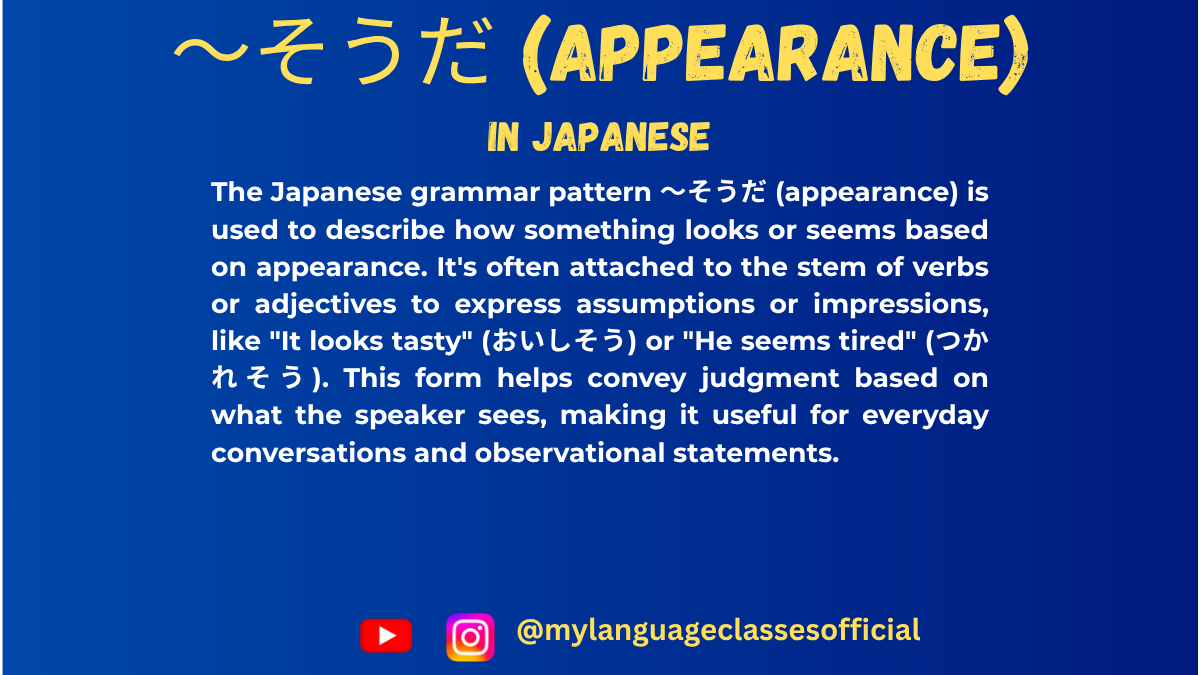
Using〜そうだ (Appearance) | My Language Classes:
Expressing ‘Looks Like’ in Japanese 〜そうだ
In Japanese, the grammar pattern 〜そうだ (sou da) is used to express that something “looks like” or “seems” a certain way based on its appearance. This pattern is useful when describing objects, actions, or situations that give a certain impression. It is often used with adjectives, nouns, and verbs, but its meaning slightly changes depending on the word category.
This blog will guide you through the formation, usage, and different contexts where 〜そうだ (Appearance) can be applied.
Formation of 〜そうだ (Appearance)
1. Using with Adjectives
- For i-adjectives: Drop the final い (i) and add 〜そうだ.
- Example: おいしい → おいしそうだ (Oishii → Oishisou da) – “Looks delicious.”
- For na-adjectives: Just add 〜そうだ directly to the adjective.
- Example: 美しい → 美しそうだ (Utsukushii → Utsukushisou da) – “Looks beautiful.”
2. Using with Verbs
- For verbs (stem form): Take the ます-stem and add 〜そうだ.
- Example: 雨が降る (Ame ga furu) → 雨が降りそうだ (Ame ga furisou da) – “It looks like it will rain.”
3. Using with Nouns
- Nouns do not usually take the 〜そうだ form when expressing appearance. Instead, のようだ or みたいだ is commonly used.
Usage of 〜そうだ (Appearance) Form
1. Describing Physical Appearance:
「他は強そうだ」
- Romaji: Kare wa tsuyosou da.
- English: He looks strong.
「このかばんは重そうだ」
- Romaji: Kono kaban wa omosou da.
- English: This bag looks heavy.
2. Expressing Predictions Based on Appearance:
「このケーキは生でたべられそうだ」
- Romaji: Kono kēki wa nama de taberare-sou da.
- English: This cake looks edible raw.
「この車はまだ動きそうだ」
- Romaji: Kono kuruma wa mada ugoki-sou da.
- English: This car looks like it can still run.
3. Talking About Immediate Future Actions:
「雨が降りそうだ」
- Romaji: Ame ga furi-sou da.
- English: It looks like it’s going to rain.
「電車が出発しそうだ」
- Romaji: Densha ga shuppatsu shisou da.
- English: The train looks like it’s about to depart.
Common Words with 〜そうだ (Appearance) Form:
Here’s a well-structured table with verbs, nouns, and adjectives in their 〜そうだ (Appearance) Form, along with two example sentences for each.
Type Word 〜そうだ Form Example Sentence 1 Romaji English Meaning Example Sentence 2 Romaji English Meaning Verb 食べる (taberu) – to eat 食べられそうだ (taberare-sou da) このケーキは美味しそうだから食べられそうだ。 Kono kēki wa oishisou dakara taberare-sou da. This cake looks delicious, so it seems edible. このスープは熱そうだけど飲めそうだ。 Kono sūpu wa atsusou dakedo nome-sou da. This soup looks hot, but it seems drinkable. Verb 壊れる (kowareru) – to break 壊れそうだ (koware-sou da) この椅子は古くて壊れそうだ。 Kono isu wa furukute koware-sou da. This chair looks old and about to break. このおもちゃは落としたら壊れそうだ。 Kono omocha wa otoshitara koware-sou da. This toy looks like it will break if dropped. Noun 雨 (ame) – rain 雨が降りそうだ (ame ga furi-sou da) 空が暗くなってきたから、雨が降りそうだ。 Sora ga kuraku natte kita kara, ame ga furi-sou da. The sky is getting dark, so it looks like it’s going to rain. 風が強くなってきたし、雨が降りそうだね。 Kaze ga tsuyoku natte kita shi, ame ga furi-sou da ne. The wind is getting stronger, and it looks like it will rain. Noun 試験 (shiken) – exam 試験が難しそうだ (shiken ga muzukashisou da) 明日の試験は難しそうだ。 Ashita no shiken wa muzukashisou da. Tomorrow’s exam looks difficult. 先生の説明を聞いて、試験が簡単そうだと思った。 Sensei no setsumei o kiite, shiken ga kantansou da to omotta. After hearing the teacher’s explanation, I thought the exam looked easy. Adjective 美味しい (oishii) – delicious 美味しそうだ (oishisou da) このラーメンは美味しそうだね! Kono rāmen wa oishisou da ne! This ramen looks delicious! おばあちゃんの作ったケーキは美味しそうだ。 Obaachan no tsukutta kēki wa oishisou da. The cake my grandmother made looks delicious. Adjective 楽しい (tanoshii) – fun 楽しそうだ (tanoshisou da) 彼らの旅行はとても楽しそうだ。 Karera no ryokō wa totemo tanoshisou da. Their trip looks really fun. あの子たちはゲームをしていて楽しそうだね。 Ano kotachi wa gēmu o shiteite tanoshisou da ne. Those kids look like they’re having fun playing games. Adjective 寒い (samui) – cold 寒そうだ (samusou da) 彼は薄い服を着ていて寒そうだ。 Kare wa usui fuku o kiteite samusou da. He is wearing thin clothes and looks cold. 外は雪が降っていてとても寒そうだ。 Soto wa yuki ga futteite totemo samusou da. It is snowing outside, and it looks very cold.
More Example Sentences
Here are 10 more example sentences using 〜そうだ (Appearance) Form, along with romaji and English meanings:
- このスープは熱そうだ。
- Romaji: Kono sūpu wa atsusou da.
- English: This soup looks hot.
- 彼は疲れていそうだ。
- Romaji: Kare wa tsukareteisou da.
- English: He looks tired.
- あの建物は古くて壊れそうだ。
- Romaji: Ano tatemono wa furukute kowaresou da.
- English: That building looks old and about to collapse.
- この箱は軽そうだね。
- Romaji: Kono hako wa karusou da ne.
- English: This box looks light.
- 彼の話は面白そうだ。
- Romaji: Kare no hanashi wa omoshirosou da.
- English: His story sounds interesting.
- この靴は履きやすそうだ。
- Romaji: Kono kutsu wa haki-yasusou da.
- English: These shoes look easy to wear.
- あの犬はおとなしくて優しそうだね。
- Romaji: Ano inu wa otonashikute yasashisou da ne.
- English: That dog looks calm and gentle.
- このカバンは丈夫そうだ。
- Romaji: Kono kaban wa joubusou da.
- English: This bag looks durable.
- 彼女の料理は美味しそうだ。
- Romaji: Kanojo no ryōri wa oishisou da.
- English: Her cooking looks delicious.
- あの道は滑りそうだから気をつけて!
- Romaji: Ano michi wa suberisou dakara ki o tsukete!
- English: That road looks slippery, so be careful!
Things to Keep in Mind About 〜そうだ (Appearance) Form
When using 〜そうだ (Appearance) Form, there are a few important points to remember:
1. Used for Visual Appearance or Impression
- This form is used when something looks a certain way based on visual observation or impression.
- Example:
- このケーキは甘そうだ。 (Kono kēki wa amasou da.) → This cake looks sweet. (Judging by appearance, not by tasting it.)
2. Not for First-Hand Experience
- It should not be used when you have direct experience with something (e.g., you actually ate the cake).
- Incorrect: このケーキを食べたけど甘そうだ。(Kono kēki o tabeta kedo amasou da.) ❌
- Correct: このケーキは甘い。(Kono kēki wa amai.) ✅ → This cake is sweet.
3. Different from 〜そうだ (Hearsay)
- 〜そうだ (Appearance) is different from 〜そうだ (Hearsay), which is used to report something you heard from someone else.
- Example (Appearance):
- 彼は元気そうだ。 (Kare wa genkisou da.) → He looks energetic.
- Example (Hearsay):
- 彼は元気だそうだ。 (Kare wa genki da sou da.) → I heard that he is energetic.
4. Adjective Conjugation Rules
- For い-adjectives: Remove い and add そうだ.
- Example: おいしい → おいしそうだ (oishii → oishisou da) → Looks delicious
- For な-adjectives: Just add そうだ.
- Example: 元気(げんき)→ 元気そうだ (genki → genkisou da) → Looks healthy
5. Special Case: Negative Form
- To say “doesn’t look ~,” change ない to なさそうだ.
- Example:
- 美味しくない (oishikunai) → 美味しくなさそうだ (oishikunasa sou da) → Doesn’t look delicious.
- 元気じゃない (genki janai) → 元気じゃなさそうだ (genki janasa sou da) → Doesn’t look healthy.
- Example:
6. Verb Usage: Potential & Immediate Action
- For potential actions: Use the stem of the potential form of the verb + そうだ.
- Example: この橋は渡れそうだ。(Kono hashi wa watare-sou da.) → This bridge looks crossable.
- For immediate actions: Use the stem of the dictionary form + そうだ.
- Example: 雨が降りそうだ。(Ame ga furi-sou da.) → It looks like it’s going to rain soon.
7. Special Irregular Adjectives
- いい (good) → よさそうだ (yosasou da) → Looks good.
- ない (not existing) → なさそうだ (nasasou da) → Doesn’t seem to exist.
Fill in the Blanks
Fill in the blanks with the correct 〜そうだ form of the given words.
Questions:
- このスープは _______ (熱い) ですね!気をつけて!
- 彼は昨日から寝ていないみたいで、とても _______ (疲れる)。
- あの子はとても _______ (賢い) ね!
- この橋は古くて _______ (壊れる)。
- あの店のラーメンは _______ (美味しい)。
- 今日は空が暗くて、雨が _______ (降る)。
- このかばんはとても _______ (丈夫) ですね。
- 彼女の話は _______ (面白い)。
- この靴は _______ (歩きやすい)。
- この椅子は _______ (座りにくい) から、別のを使おう。
Answers:
- 熱そうだ (atsusou da)
- 疲れていそうだ (tsukareteisou da)
- 賢そうだ (kashikoso da)
- 壊れそうだ (kowaresou da)
- 美味しそうだ (oishisou da)
- 降りそうだ (furisou da)
- 丈夫そうだ (joubusou da)
- 面白そうだ (omoshirosou da)
- 歩きやすそうだ (arukiyasusou da)
- 座りにくそうだ (suwarinikusou da)
Conclusion
Mastering 〜そうだ (Appearance) Form is a great way to express observations and predictions based on how things look. Whether describing someone’s emotions, the taste of food, or a future event, this grammar pattern helps make your Japanese sound more natural and fluent.
By understanding its conjugation rules, differences from hearsay 〜そうだ, and special cases, you can use it confidently in daily conversations. Keep practicing with real-life examples, and soon, you’ll be able to describe appearances effortlessly in Japanese!
If you found this guide helpful, feel free to explore more Japanese grammar lessons and keep improving your language skills.
If you enjoyed this lesson, be sure to check out more posts like this on my blog at My Language Classes. Don’t forget to subscribe my YouTube channel and follow me on Instagram for the latest language learning tips and lessons. Leave a comment below to share your thoughts, or ask any questions you have about nouns.
Happy learning! 😊
- For i-adjectives: Drop the final い (i) and add 〜そうだ.
-
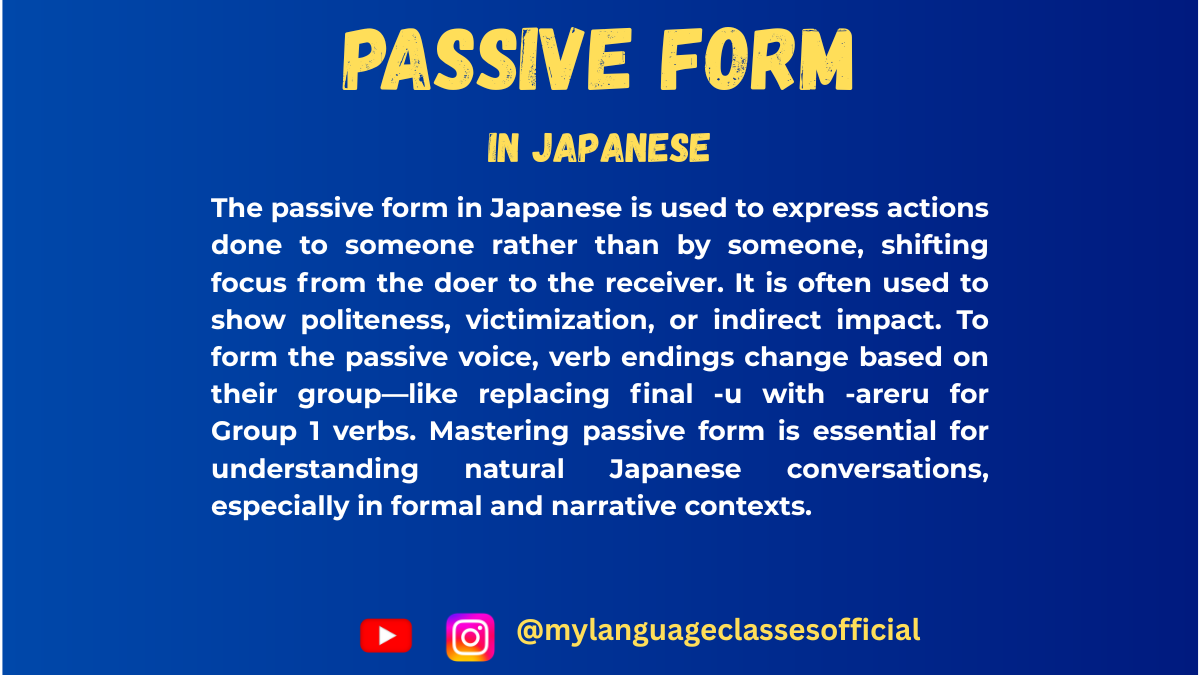
Passive Form of Verbs in Japanese | My Language Classes
Understanding Passive Form in Japanese
The passive form (受身形, うけみけい) in Japanese is used in various situations, primarily to describe actions where the subject is affected by someone else’s actions. Unlike in English, where the passive voice is often avoided, Japanese frequently uses it in daily conversations and formal writing. In this blog post, we will thoroughly explore the formation and usage of passive verbs in different contexts.
Usage of Passive Form in Japanese
The passive form is used in the following situations:
- When someone is negatively affected by an action (被害受身 – ひがいうけみ)
- Japanese: 私は弟にケーキを食べられました。
- Romaji: Watashi wa otōto ni kēki o taberaremashita.
- Meaning: I had my cake eaten by my younger brother.
- When describing an event from the perspective of the affected person
- Japanese: 私は先生にほめられました。
- Romaji: Watashi wa sensei ni homeraremashita.
- Meaning: I was praised by my teacher.
- When discussing historical or public events
- Japanese: このお寺は100年前に建てられました。
- Romaji: Kono otera wa hyaku nen mae ni tateraremashita.
- Meaning: This temple was built 100 years ago.
- When avoiding mentioning the doer explicitly (formal, impersonal expressions)
- Japanese: 日本ではお米が多く食べられています。
- Romaji: Nihon de wa okome ga ōku taberareteimasu.
- Meaning: Rice is widely eaten in Japan.
- When talking about natural phenomena
- Japanese: その山は雪で覆われています。
- Romaji: Sono yama wa yuki de ōwareteimasu.
- Meaning: That mountain is covered with snow.
- In literary or poetic expressions
- Japanese: 彼女の歌は世界中で聞かれています。
- Romaji: Kanojo no uta wa sekaijū de kikareteimasu.
- Meaning: Her songs are heard all over the world.
Formation of Passive Verbs
Japanese verbs are categorized into three groups. The passive form is formed differently for each group.
Group 1 (Ichidan verbs / 一段動詞)
Formation: Drop the final る and add られる
Verb Potential Form Passive Form Example Sentence (Japanese) Romaji Meaning 食べる (たべる) 食べられる 食べられる 私は友達にお菓子を食べられた。 Watashi wa tomodachi ni okashi o taberareta. I had my sweets eaten by a friend. 見る (みる) 見られる 見られる 私の秘密はみんなに見られた。 Watashi no himitsu wa minna ni mirareta. My secret was seen by everyone. 教える (おしえる) 教えられる 教えられる 日本語は先生に教えられた。 Nihongo wa sensei ni oshierareta. Japanese was taught by the teacher. Group 2 (Godan verbs / 五段動詞)
Formation: Change the final u sound to a sound and add れる
Verb Potential Form Passive Form Example Sentence (Japanese) Romaji Meaning 書く (かく) 書ける 書かれる 私の名前が黒板に書かれた。 Watashi no namae ga kokuban ni kakareta. My name was written on the blackboard. 読む (よむ) 読める 読まれる この本は多くの人に読まれた。 Kono hon wa ōku no hito ni yomareta. This book was read by many people. 言う (いう) 言える 言われる 先生に「すごい」と言われた。 Sensei ni “sugoi” to iwareta. I was told “amazing” by the teacher. Group 3 (Irregular verbs / 不規則動詞)
Verb Potential Form Passive Form Example Sentence (Japanese) Romaji Meaning する できる される 彼の仕事は上司に評価された。 Kare no shigoto wa jōshi ni hyōka sareta. His work was evaluated by the boss. 来る (くる) 来られる 来られる 私の家に友達が来られた。 Watashi no ie ni tomodachi ga korareta. A friend came to my house.
More Example Sentences
- 彼は友達にからかわれた。 (Kare wa tomodachi ni karakawareta.) – He was teased by his friends.
- 雨が降って、試合が中止された。 (Ame ga futte, shiai ga chūshi sareta.) – The match was canceled due to rain.
- 私の自転車が盗まれた。 (Watashi no jitensha ga nusumareta.) – My bicycle was stolen.
- その映画は世界中で見られている。 (Sono eiga wa sekaijū de mirareteiru.) – The movie is being watched worldwide.
- 彼は先生に叱られた。 (Kare wa sensei ni shikarareta.) – He was scolded by the teacher.
- この本は多くの人に読まれた。 (Kono hon wa ōku no hito ni yomareta.) – This book was read by many people.
- 先生に質問が聞かれた。 (Sensei ni shitsumon ga kikareta.) – A question was asked by the teacher.
- 日本では魚がよく食べられる。 (Nihon de wa sakana ga yoku taberareru.) – Fish is often eaten in Japan.
- その話は新聞に書かれていた。 (Sono hanashi wa shinbun ni kakareteita.) – That story was written in the newspaper.
- 彼の名前は歴史に残されている。 (Kare no namae wa rekishi ni nokosareteiru.) – His name is left in history.
Fill in the Blanks Exercise:
- 私の名前が黒板に____。
- 先生にほめ____。
- 私は友達にお弁当を____。
- その建物は100年前に____。
- その映画はたくさんの人に____。
- 宿題が____。
- 彼は友達に____。
- その話は新聞に____。
- 日本では魚がよく____。
- 彼の仕事は上司に____。
Answers:
- 書かれた 2. られた 3. 食べられた 4. 建てられた 5. 見られた 6. された 7. からかわれた 8. 書かれた 9. 食べられる 10. 評価された
Things to Keep in Mind
- Passive verbs often imply an indirect effect on the subject.
- Passive form is commonly used in formal writing and polite speech.
- Certain verbs are more frequently used in passive form, such as 言う (to say), 書く (to write), and する (to do).
- When the subject is negatively affected, the nuance of 被害受身 (negative passive) comes into play.
- Passive sentences often omit the doer (agent) for a softer, indirect tone.
Conclusion
Mastering the passive form of verbs in Japanese is crucial for fluency and understanding natural speech patterns. It is widely used in both formal and informal contexts. By practicing passive verb conjugations and understanding their nuanced usage, learners can improve their comprehension and communication skills in Japanese effectively. Keep practicing and using these forms in daily conversation to become more proficient!
If you enjoyed this lesson, be sure to check out more posts like this on my blog at My Language Classes. Don’t forget to subscribe my YouTube channel and follow me on Instagram for the latest language learning tips and lessons. Leave a comment below to share your thoughts, or ask any questions you have about nouns.
Happy learning! 😊
- When someone is negatively affected by an action (被害受身 – ひがいうけみ)
-
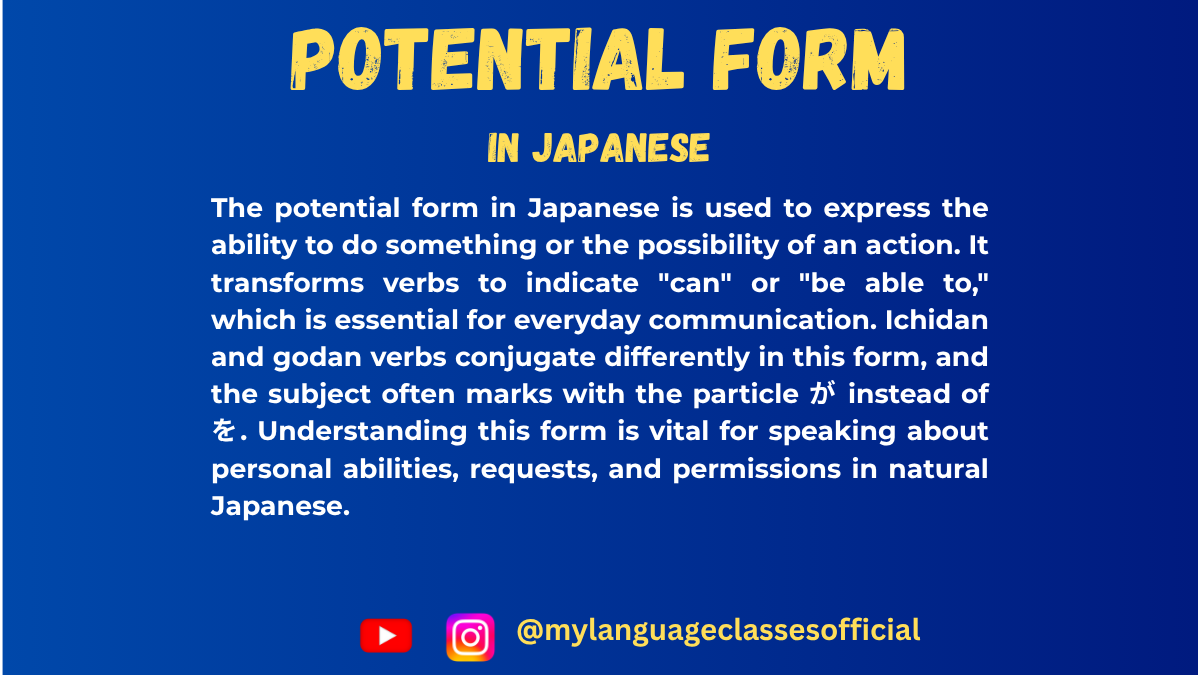
Potential Form of Verbs in Japanese | My Language Classes
Understanding Potential Form
The potential form (可能形, かのうけい) of verbs in Japanese expresses the ability or possibility to do something. This form is widely used in everyday conversations to talk about what someone can or cannot do.
Usage of Potential Form in Different Situations
- Expressing Ability
- 日本語を話せます。(I can speak Japanese.)
- Expressing Capability
- ここから富士山が見えます。(You can see Mount Fuji from here.)
- Expressing Permission
- この図書館では本を借りられます。(You can borrow books in this library.)
- Expressing Physical or Situational Possibility
- 今日は忙しいので、映画に行けません。(I am busy today, so I can’t go to the movies.)
- Expressing Potential in Hypothetical Scenarios
- 彼が来たら、もっと話せると思います。(If he comes, I think I will be able to talk more.)
- Asking About Ability
- ピアノが弾けますか? (Can you play the piano?)
- Denying Capability
- 漢字が読めません。(I can’t read kanji.)
- Expressing Limited Ability (Using なら)
- スペイン語なら話せます。(If it’s Spanish, I can speak it.)
Formation of Potential Form
Japanese verbs are categorized into three groups, and the potential form is formed differently for each.
Group 1 (Godan Verbs / 五段動詞)
For 五段動詞 (Godan verbs), replace the final う sound with える.
Dictionary Form Potential Form Example Sentence 1 Example Sentence 2 書く (to write) 書ける 日本語が書けます。(I can write in Japanese.) 漢字が書けません。(I can’t write kanji.) 行く (to go) 行ける 明日、海に行けます。(I can go to the beach tomorrow.) 東京には行けません。(I can’t go to Tokyo.) 話す (to speak) 話せる 日本語が話せますか?(Can you speak Japanese?) 彼は英語が話せません。(He can’t speak English.) 飲む (to drink) 飲める お酒が飲めますか?(Can you drink alcohol?) ビールが飲めません。(I can’t drink beer.) 泳ぐ (to swim) 泳げる 彼は速く泳げます。(He can swim fast.) 海では泳げません。(I can’t swim in the sea.) 買う (to buy) 買える この店でケーキが買えます。(You can buy cakes at this shop.) 今日は買えません。(I can’t buy it today.) 作る (to make) 作れる 美味しい料理が作れます。(I can make delicious food.) パンは作れません。(I can’t make bread.) Group 2 (Ichidan Verbs / 一段動詞)
For 一段動詞 (Ichidan verbs), replace る with られる.
Dictionary Form Potential Form Example Sentence 1 Example Sentence 2 食べる (to eat) 食べられる 何でも食べられます。(I can eat anything.) 魚が食べられません。(I can’t eat fish.) 見る (to see) 見られる この映画が見られます。(You can watch this movie.) 明日は見られません。(I can’t watch it tomorrow.) 着る (to wear) 着られる 和服が着られます。(I can wear a kimono.) その服は着られません。(I can’t wear those clothes.) 起きる (to wake up) 起きられる 朝6時に起きられます。(I can wake up at 6 AM.) 今日は早く起きられません。(I can’t wake up early today.) 忘れる (to forget) 忘れられる 昨日のことが忘れられます。(I can forget about yesterday.) その話は忘れられません。(I can’t forget that story.) Group 3 (Irregular Verbs / 不規則動詞)
The two irregular verbs in Japanese have unique potential forms.
Dictionary Form Potential Form Example Sentence 1 Example Sentence 2 する (to do) できる サッカーができます。(I can play soccer.) 今日は運動ができません。(I can’t exercise today.) 来る (to come) 来られる 彼は会議に来られます。(He can come to the meeting.) 明日は来られません。(I can’t come tomorrow.) More Example Sentences
- 私は日本語が話せます。
(I can speak Japanese.) → [Godan Verb: 話す → 話せる] - この店ではケーキが買えます。
(You can buy cakes at this shop.) → [Godan Verb: 買う → 買える] - 今日は早く起きられません。
(I can’t wake up early today.) → [Ichidan Verb: 起きる → 起きられる] - この映画はネットで見られます。
(You can watch this movie online.) → [Ichidan Verb: 見る → 見られる] - ピアノが弾けますか?
(Can you play the piano?) → [Godan Verb: 弾く → 弾ける] - 彼は速く泳げます。
(He can swim fast.) → [Godan Verb: 泳ぐ → 泳げる] - 明日は学校に行けません。
(I can’t go to school tomorrow.) → [Godan Verb: 行く → 行ける] - この本は図書館で借りられます。
(You can borrow this book from the library.) → [Ichidan Verb: 借りる → 借りられる] - サッカーができますか?
(Can you play soccer?) → [Irregular Verb: する → できる] - 彼は明日の会議に来られます。
(He can come to tomorrow’s meeting.) → [Irregular Verb: 来る → 来られる]
These examples cover various real-life situations where the potential form is commonly used. Let me know in comment if you need more examples!
Fill in the Blanks Exercise:
- 日本語が____ますか? (Can you speak Japanese?)
- この映画はネットで____ます。 (You can watch this movie online.)
- 今日は早く____ません。 (I can’t wake up early today.)
- 美味しい料理が____ますか? (Can you make delicious food?)
- ここでは写真を____ません。 (You can’t take pictures here.)
- 彼女はピアノが____ません。 (She can’t play the piano.)
- この店ではケーキが____ます。 (You can buy cakes at this shop.)
- その本が____ますか? (Can you read that book?)
- 彼は会議に____ますか? (Can he come to the meeting?)
- お酒が____ません。 (I can’t drink alcohol.)
Answers
- 話せ
- 見られ
- 起きられ
- 作れ
- 撮れ
- 弾け
- 買え
- 読め
- 来られ
- 飲め
Notes on Usage
- Shortened Form of Ichidan Verbs: In casual speech, some people drop ら from られる and say 食べれる, 見れる, etc. However, this is considered informal and not grammatically standard.
- Using を or が: When using potential form, the object marker を is often replaced with が.
- Correct: 漢字が書ける。
- Acceptable (less common): 漢字を書ける。
- Negative Form: Add ない to the potential form.
- 漢字が読めない (I can’t read kanji.)
- Polite Form: Add ます to the potential form.
- 漢字が読めます (I can read kanji.)
Mastering the potential form will help you express what you can and cannot do in Japanese fluently! Try using it in daily conversations to reinforce your understanding. 頑張ってください! (Good luck!)
If you enjoyed this lesson, be sure to check out more posts like this on my blog at My Language Classes. Don’t forget to subscribe my YouTube channel and follow me on Instagram for the latest language learning tips and lessons. Leave a comment below to share your thoughts, or ask any questions you have about nouns.
Happy learning! 😊
- Expressing Ability
-
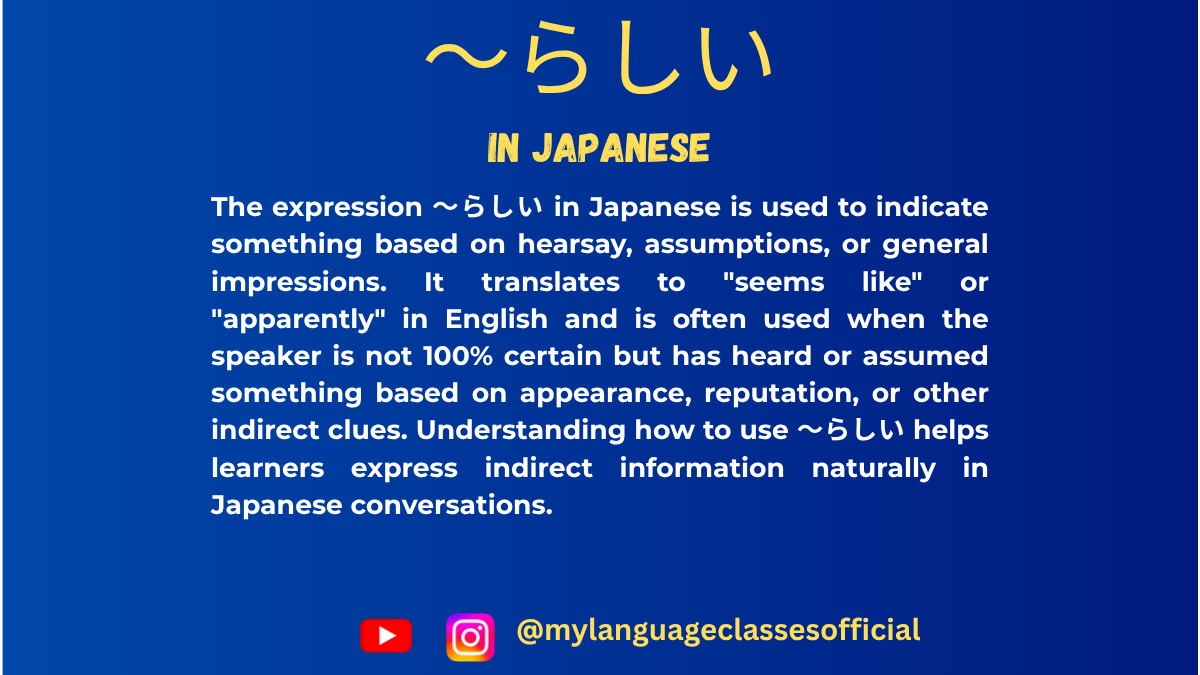
Understanding 〜らしい in Japanese | My Language Classes
Understanding 〜らしい in Japanese
When learning Japanese, one of the essential expressions to understand is 〜らしい. This suffix plays a vital role in expressing assumptions, hearsay, characteristics, and appropriateness. In this blog post, we will explore all possible usages of 〜らしい, providing clear explanations and examples.
1. Expressing Hearsay or Second-hand Information
One of the most common uses of 〜らしい is to indicate information that the speaker has heard from someone else but has not personally verified.
Structure:
Verb (Plain Form) + らしい
い-adjective (Plain Form) + らしい
な-adjective + らしい
Noun + らしいExamples:
- そのレストランは美味しいらしいよ。
(I heard that restaurant is delicious.) - たろうは今日休むらしい。
(I heard that Tarou is taking the day off today.) - この映画はめちゃくちゃ面白いらしい。
(I heard that this movie is really interesting.)
Usage Note:
Compared to そうだ, which is also used for hearsay, らしい implies that the information is based on indirect sources rather than direct observation.
2. Expressing Assumptions or Inferences
Another way to use 〜らしい is when making an assumption based on evidence.
Examples:
- たくさんの人が黒い服を着ている。 お蔵式があったらしい。
(Many people are wearing black clothes. It looks like there was a funeral.) - あの子はプロ野球選手の子どもらしい。
(That child seems to be the son of a professional baseball player.)
Usage Note:
This is different from ようだ, which is used for assumptions based on visual evidence, whereas らしい is based on reasoning or known facts.
3. Expressing Typical Characteristics
〜らしい can also be used to describe something that has the typical characteristics of a person, thing, or behavior.
Examples:
- このラーメンは日本らしい味だね。
(This ramen has a very “Japanese” flavor.) - かれは仕事に小さいことまで注意を払う。真面目らしい人だ。
(He pays attention to small details in his work. He is a serious person.) - 她はいつも元気で、すごく子どもらしい。
(She is always energetic, very much like a child.)
Usage Note:
This usage expresses the “essence” of something or someone. It is similar to みたい but is more about inherent qualities rather than just resemblance.
4. Expressing Suitability or Appropriateness
In some cases, 〜らしい can be used to indicate something that fits a certain expectation or role.
Examples:
- 日本らしいけしきゃんの誕生日プレゼントを買いたい。
(I want to buy a birthday present that is “Japanese-like”.) - 少年らしい仕事を求めている。
(Looking for work suitable for young people.)
Usage Note:
This is closely related to the “typical characteristics” meaning but emphasizes suitability rather than mere resemblance.
Situations Where 〜らしい is Used
Below is a list of common situations where 〜らしい is applicable:
- Hearsay – When conveying information heard from others.
- Inference – When making an assumption based on indirect evidence.
- Typical Characteristics – When describing something as having the essence of a person, thing, or behavior.
- Suitability – When expressing something as being appropriate for a certain role or image.
- Rumors – When talking about unverified rumors or gossip.
Final Thoughts
Mastering 〜らしい is essential for expressing assumptions, typicality, and hearsay in Japanese. While it might seem tricky at first, practicing with real-life examples and distinguishing it from similar expressions like そうだ and ようだ will help you use it naturally.
By understanding these nuances, you’ll be able to sound more fluent and natural in your Japanese conversations. Keep practicing, and don’t hesitate to use 〜らしい in different situations!
If you enjoyed this lesson, be sure to check out more posts like this on my blog at My Language Classes. Don’t forget to subscribe my YouTube channel and follow me on Instagram for the latest language learning tips and lessons. Leave a comment below to share your thoughts, or ask any questions you have about nouns.
Happy learning! 😊
- そのレストランは美味しいらしいよ。
-
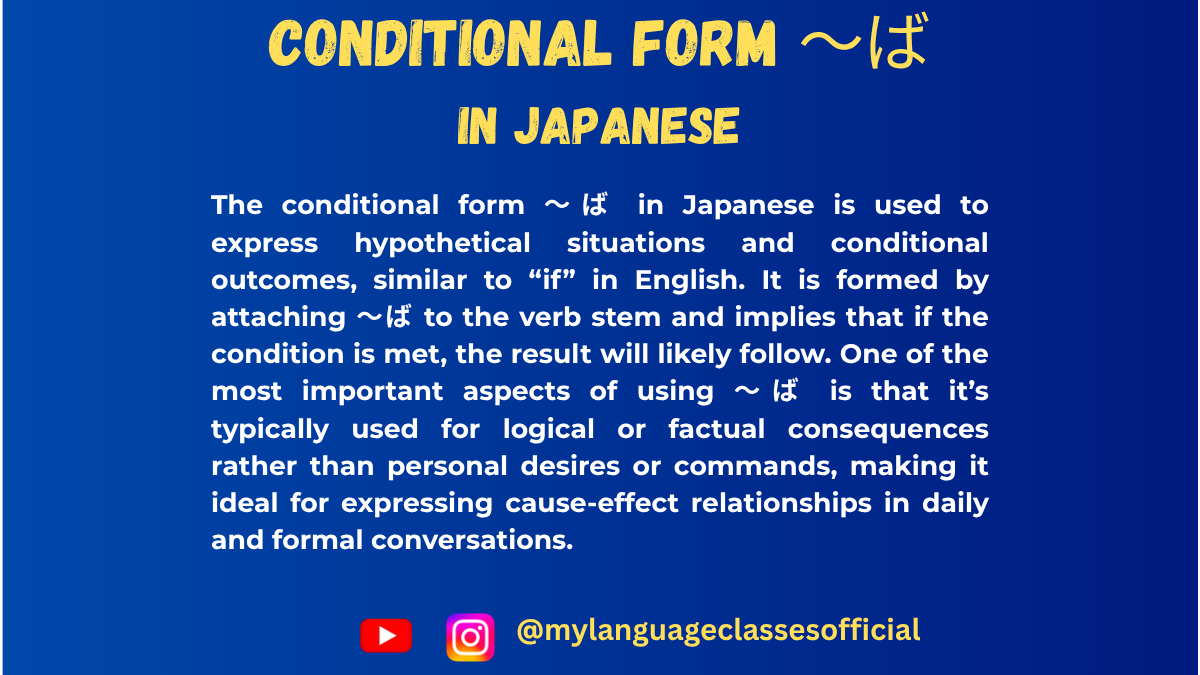
Using 〜ば (Conditional) | My Language Classes
Understanding 〜ば: The Conditional Form in Japanese
The Japanese conditional form 〜ば is an essential grammatical structure used to express conditions, similar to “if” or “when” in English. It provides a flexible way to convey cause-and-effect relationships, hypothetical situations, and natural consequences. Let’s dive deep into its usage, exploring its nuances, and highlight situations where it can be used effectively.
What is 〜ば?
The particle 〜ば attaches to the stem of verbs or adjectives to create a conditional clause. It is equivalent to saying, “If [X], then [Y].”
How to Form 〜ば?
- For Verbs:
- Take the dictionary form of a verb.
- Convert the verb to its 仮定形 (hypothetical form) by changing the ending:
- Group 1 (五段動詞): Change the last character to its え-sound + ば.
- Example: 行く → 行けば
- Group 2 (一段動詞): Replace る with れば.
- Example: 食べる → 食べれば
- Irregular verbs:
- する → すれば
- くる → くれば
- Group 1 (五段動詞): Change the last character to its え-sound + ば.
- Result:
- Verb stem + ば = Conditional form.
- For Adjectives:
- い-adjectives:
- Drop the final い and add ければ.
- Example: 高い → 高ければ
- Drop the final い and add ければ.
- な-adjectives:
- Add ならば after the adjective stem.
- Example: 静か → 静かならば
- Add ならば after the adjective stem.
- い-adjectives:
- For Nouns:
- Add ならば after the noun.
- Example: 学生 → 学生ならば
- Add ならば after the noun.
Usage of 〜ば
- To Express Hypothetical Conditions
When you want to describe a situation that may or may not happen, 〜ば is perfect for creating “if” clauses.- Example:
明日雨が降れば、試合は中止です。
If it rains tomorrow, the match will be canceled.
- Example:
- To Indicate Natural or Logical Consequences
〜ば is often used to explain cause-and-effect relationships that feel natural.- Example:
努力すれば、成功します。
If you make an effort, you will succeed.
- Example:
- To Offer Suggestions or Advice
In conversational Japanese, 〜ば can give a softer tone when offering suggestions.- Example:
もっと早く寝れば、疲れが取れますよ。
If you sleep earlier, you’ll feel less tired.
- Example:
- To Express Regret or Reflection (Negative 〜ば)
When used in hindsight or regret, negative forms with 〜ば are common.- Example:
あの時、行かなければよかった。
I should not have gone at that time.
- Example:
- To Indicate Conditions for General Truths
Use 〜ば for statements that hold universally true under specific conditions.- Example:
火をつければ、水は蒸発する。
If you apply heat, water evaporates.
- Example:
- In Hypothetical Questions
〜ば is sometimes used to ask “what if” questions.- Example:
もし宝くじが当たれば、何をしますか?
If you win the lottery, what would you do?
- Example:
- Paired with Expressions of Hope or Desire
Combine 〜ば with verbs like いい or よい to express a wish or hope.- Example:
雨が止めばいいですね。
I hope the rain stops.
- Example:
- To Express Dependency
Describing situations where one thing depends on another.- Example:
彼が来れば、私たちは始めます。
If he comes, we will start.
- Example:
Key Points and Usage Notes
- Difference Between 〜ば and Other Conditionals (〜たら, 〜と, なら):
- 〜ば: Focuses on logical relationships and is often used for cause and effect.
- 〜たら: More versatile, used for real or imagined situations, often for past and specific contexts.
- 〜と: Used for natural consequences or habitual actions.
- 〜なら: Highlights conditions and is often used to suggest or clarify.
- 雨が降れば、試合は中止です。 (Logical relationship)
- 雨が降ったら、試合は中止です。 (Specific context, imagining the situation)
- 雨が降ると、試合は中止です。 (Natural consequence, habitual)
- 雨なら、試合は中止です。 (Condition clarified, suggesting understanding)
- Avoid Overusing 〜ば in Casual Speech:
While grammatically correct, 〜ば can sound formal or academic. For casual conversations, 〜たら or 〜と may be more natural. - Negating 〜ば:
To negate, use 〜なければ.- Example:
時間がなければ、参加しなくてもいいです。
If you don’t have time, you don’t need to participate.
- Example:
- Hypothetical Past with Regret:
Combine with expressions like よかった to express past hypotheticals.- Example:
もっと頑張ればよかった。
I should have tried harder.
- Example:
Situations Where 〜ば is Used
Here’s a summary of situations where you can use 〜ば effectively:
- Expressing hypothetical conditions.
- Explaining logical or natural consequences.
- Offering advice or suggestions.
- Reflecting on regrets or hindsight.
- Describing general truths or universal principles.
- Posing hypothetical or “what if” questions.
- Expressing hope or desire.
- Indicating dependencies between actions or events.
Practice Exercises
- Convert the following sentences into the 〜ば form:
- 明日、時間があるなら、一緒に映画を見ます。
- 成績が悪いと、両親に怒られます。
- Translate these English sentences into Japanese using 〜ば:
- If you study every day, you will pass the test.
- If it’s cold, let’s drink hot tea.
Mastering 〜ば will open up a range of expressive possibilities in your Japanese communication. With practice, you’ll find it natural to use this conditional form in both formal and everyday contexts. Keep practicing and experiment with its flexibility to become more fluent!
If you enjoyed this lesson, be sure to check out more posts like this on my blog at My Language Classes. Don’t forget to subscribe my YouTube channel and follow me on Instagram for the latest language learning tips and lessons. Leave a comment below to share your thoughts, or ask any questions you have about nouns.
Happy learning! 😊
- For Verbs:
-
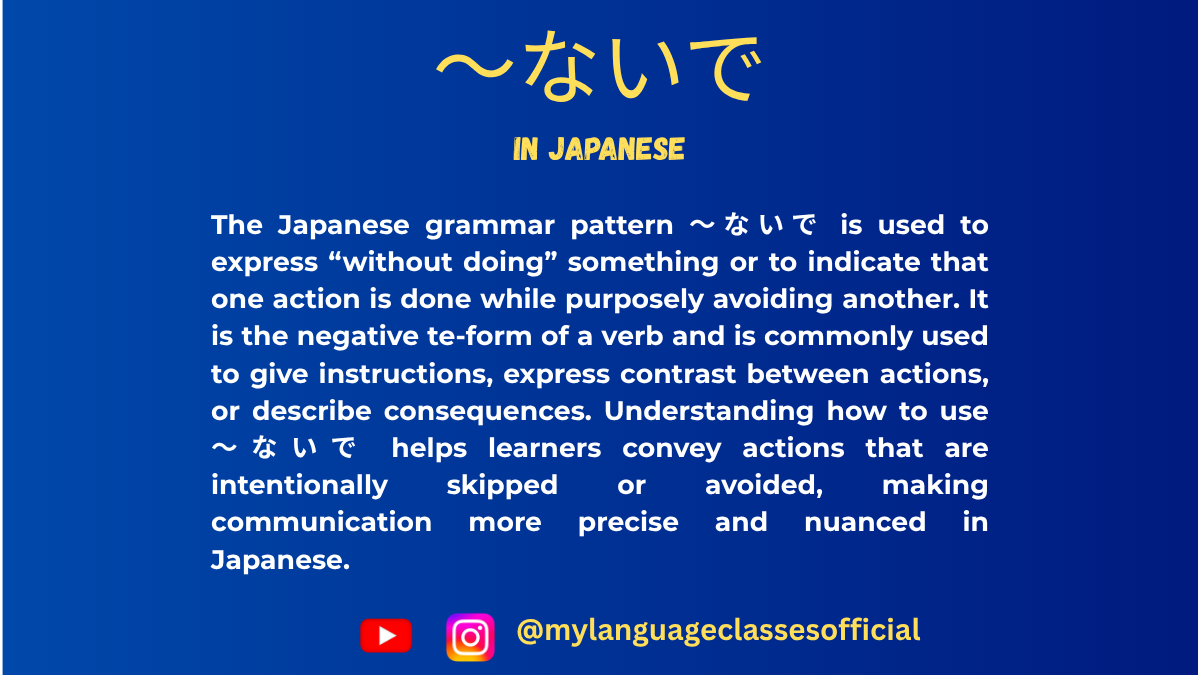
Expressing “without doing” in Japanese: 〜ないで | My Language Classes
Using 〜ないで in Japanese
Learning how to express “without doing” in Japanese is essential for mastering natural and nuanced communication. The grammar structure 〜ないで (“〜naide”) is a versatile and commonly used expression in Japanese that allows speakers to convey the idea of “not doing something” or “without doing something.” In this blog post, we will explore the various situations where 〜ないで is used, its nuances, and how to incorporate it into your conversations.
What is 〜ないで?
〜ないで is the negative て-form of a verb. It attaches to the plain negative form (〜ない) of a verb to indicate actions that are not done or states that are avoided. Depending on the context, 〜ないで can:
- Express doing something without performing another action.
- Serve as a request or instruction not to do something.
- Indicate cause and effect, such as when one action was done because another was avoided.
Usage of 〜ないで
1. Expressing “without doing something”
This is the most common usage, where 〜ないで describes an action performed in the absence of another action.
- Structure: 〜ないで + another verb/action
- Examples:
- 家を出る前に朝ごはんを食べないで行きました。 (Ie o deru mae ni asagohan o tabenai de ikimashita.) “I left the house without eating breakfast.”
- 仕事を終えないで帰ってはだめです。 (Shigoto o oenai de kaette wa dame desu.) “You shouldn’t go home without finishing your work.”
2. Giving instructions or making requests
When used as a standalone phrase, 〜ないで acts as a direct or polite request not to perform a certain action.
- Structure: Verb (negative form) + ないで
- Examples:
- 詐欺にないで下さい。 (Saguni nai de kudasai.) “Please don’t lie.”
- ここですわらないで。 (Koko de suwaranai de.) “Don’t sit here.”
3. Cause and effect
In some cases, 〜ないで implies that a subsequent action happened because the preceding action was avoided.
- Structure: Verb (negative form) + ないで
- Examples:
- 「話しないで気づいてくれた。」 (Hanashinaide kidzuite kureta.) “They noticed without me saying anything.”
- 親に聞かないで自分で決めました。 (Oya ni kikanaide jibun de kimemashita.) “I decided on my own without asking my parents.”
4. Contrastive emphasis
Here, 〜ないで can emphasize a contrast between what is done and what is not done.
- Structure: 〜ないで + another clause/action
- Examples:
- さんぽを買わないで、アイスを買いました。 (Sanpo o kawanai de, aisu o kaimashita.) “I didn’t buy a sandwich; I bought ice cream instead.”
- 電車で行かないで、歩きました。 (Densha de ikanai de, arukimashita.) “I didn’t take the train; I walked instead.”
Situations Where 〜ないで is Used
- Describing actions done without another action:
- Leaving the house without eating.
- Traveling without packing necessary items.
- Making polite or casual requests:
- Asking someone not to smoke.
- Requesting someone to stay quiet.
- Cause and effect relationships:
- Explaining results stemming from avoiding an action.
- Contrasting actions:
- Highlighting differences between what was done and what wasn’t.
- In storytelling or hypothetical scenarios:
- Creating imagery of what happens when an action is avoided.
Important Notes on 〜ないで
- Formality: 〜ないで is appropriate in both casual and polite speech, but ensure you adjust the overall sentence to suit the context.
- Difference from 〜なくて: While both 〜ないで and 〜なくて convey negation, 〜ないで is specific to “without doing” or “don’t do,” whereas 〜なくて often implies “because not doing.”
- Example:
- 食べないで出かけた。 (“I went out without eating.”)
- 食べなくて出かけた。 (“I went out because I didn’t eat.”)
- Example:
- Verb nuance: The preceding verb influences the meaning and nuance of 〜ないで. Contextual understanding is crucial.
Practice Exercises
Try these sentences to solidify your understanding:
- Translate: “Please don’t run in the hallway.”
- Fill in the blank: 仕事をしないで、\u___。 (Hint: “Relax at home.”)
- Explain the difference in nuance between しないで and しなくて in a given context.
Mastering 〜ないで expands your ability to express nuanced actions and instructions in Japanese. With practice, you’ll find this structure indispensable in your language toolkit. Happy learning!
If you enjoyed this lesson, be sure to check out more posts like this on my blog at My Language Classes. Don’t forget to subscribe my YouTube channel and follow me on Instagram for the latest language learning tips and lessons. Leave a comment below to share your thoughts, or ask any questions you have about nouns.
Happy learning! 😊
-
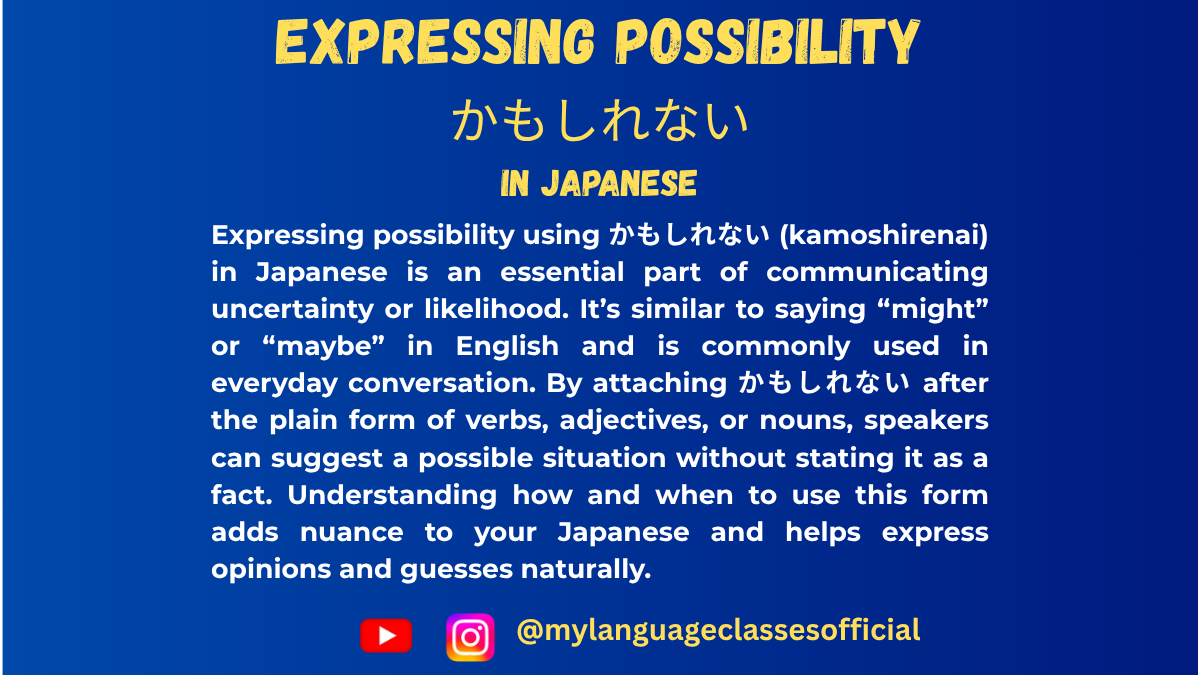
How to Use かもしれない | My Language Classes
Expressing Possibility in Japanese: かもしれない
When learning Japanese, understanding how to express possibility or uncertainty is essential for nuanced communication. The phrase かもしれない (かも) is a versatile and frequently used expression in Japanese to indicate that something “might” happen or “could” be the case. In this blog post, we will delve deeply into the usage of かもしれない, including its grammatical structure, variations, and common situations where it is used.
What Does かもしれない Mean?
かもしれない literally translates to “might” or “could,” expressing a sense of possibility or uncertainty about a situation. It is often used when the speaker is unsure about the likelihood of an event or fact but wants to acknowledge its potentiality.
Variations in Formality:
- Casual: かもしれない
- Polite: かもしれません
- Abbreviated (Casual Speech): かも
- Example: これは大変かも。 (This could be serious.)
Grammatical Structure
かもしれない follows directly after a predicate and can attach to various parts of speech:
- Nouns:
- Structure: [Noun] + かもしれない
- Example: これはプレゼントかもしれない。 (This might be a present.)
- Adjectives (i-adjectives):
- Structure: [i-adjective] + かもしれない
- Example: あの店は高いかもしれない。 (That shop might be expensive.)
- Adjectives (na-adjectives):
- Structure: [na-adjective] + だ + かもしれない
- Example: この話は大事だかもしれない。 (This story might be important.)
- Verbs:
- Structure: [Verb (plain form)] + かもしれない
- Example: かれは来るかもしれない。 (He might come.)
Key Points to Remember
- Degree of Possibility: かもしれない implies a low to moderate degree of certainty. It’s not used for highly probable events.
- Uncertainty Tone: This expression adds a soft, non-committal tone to statements, making it useful in conversations where certainty is lacking.
- Position in Sentence:
- Always follows the predicate directly.
- Cannot be used at the start of a sentence.
- Politeness: Use かもしれません in formal situations or when speaking to superiors.
Common Situations to Use かもしれない
Here are some typical scenarios where かもしれない is used:
1. Guessing About Someone’s Actions:
- 他は明日会社に来ないかもしれない。
(He might not come to the office tomorrow.)
2. Weather Predictions:
- 今夜は雨が降るかもしれない。
(It might rain tonight.)
3. Speculating About the Past:
- 他はこのテストに落ちたかもしれない。
(He might have failed this test.)
4. Expressing Caution:
- その道は危ないかもしれない。
(That path might be dangerous.)
5. Making Suggestions With Hesitation:
- これを使ったら良い結果がでるかもしれない。
(Using this might give good results.)
6. Talking About Plans:
- 私は今年日本へ行くかもしれない。
(I might go to Japan this year.)
7. Health Concerns:
- あなたは病気になりかけているかもしれない。
(You might be getting sick.)
Practical Notes on Usage
- Avoid Overuse: While かもしれない is useful, overusing it can make your statements seem overly speculative.
- Alternative Phrases:
- Instead of かもしれない, consider using 可能性がある (かのうせいがある, “there is a possibility”) for more formal contexts.
- Context Matters:
- Use かもしれない sparingly in professional or serious settings where certainty is preferred.
Practice Exercise
Complete the following sentences with かもしれない:
- 今日はカラオケが出る…。
(It might snow today.) - あの人はこの仕事をキャンセルする…。
(That person might cancel this task.) - この商品は新品じゃない…。
(This product might not be new.)
Conclusion
かもしれない is a subtle yet powerful expression for conveying possibility and uncertainty in Japanese. By mastering its usage, you can add nuance to your conversations and sound more natural when speaking Japanese. Practice using it in different scenarios, and you’ll find it becoming a natural part of your language toolbox!
If you enjoyed this lesson, be sure to check out more posts like this on my blog at My Language Classes. Don’t forget to subscribe my YouTube channel and follow me on Instagram for the latest language learning tips and lessons. Leave a comment below to share your thoughts, or ask any questions you have about nouns.
Happy learning! 😊
-
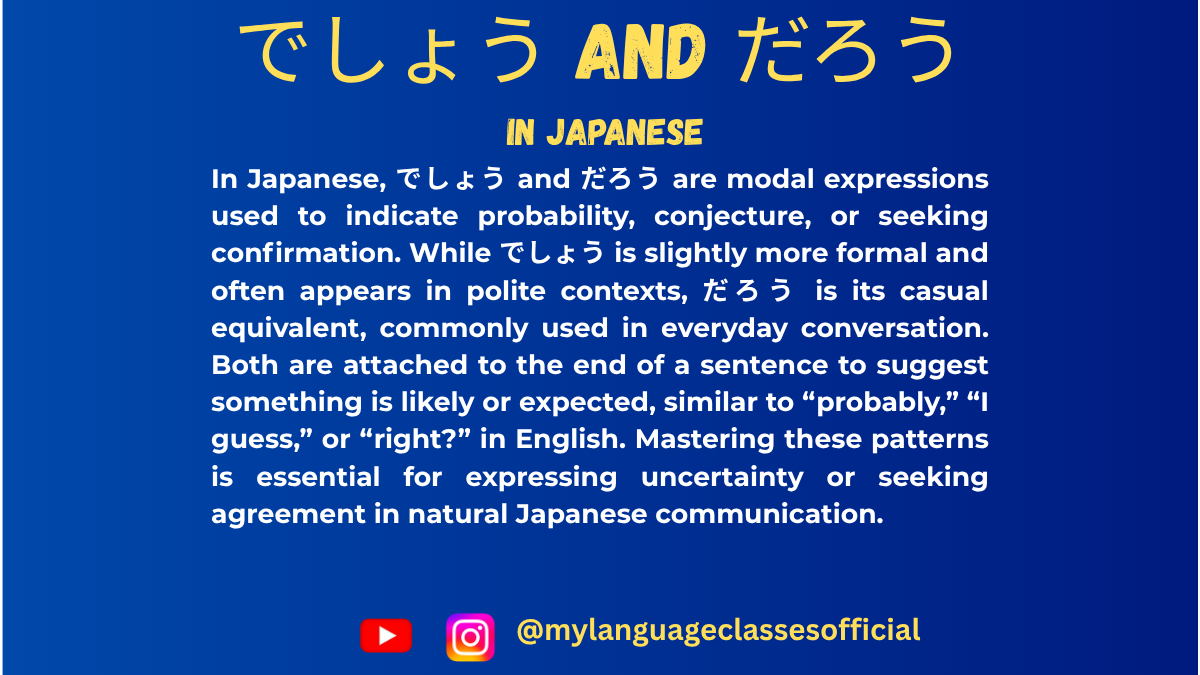
Understanding 〜でしょう/だろう in Japanese | My Language Classes
Expressions used to indicate probability, conjecture, or seeking confirmation
If you’re diving into the world of Japanese grammar, the particle でしょう (deshou) is one you’ll encounter frequently. It’s a versatile expression that conveys probability, speculation, or seeks confirmation. In this blog post, we’ll explore all the nuances of でしょう, its various uses, and how it interacts with other elements of the language.
1. What is でしょう?
でしょう is the polite form of だろう, which itself is derived from the copula だ (used to state facts). Depending on the context and tone, it can mean:
- “Probably”
- “I suppose”
- “Right?” (as a tag question seeking agreement)
- “It seems that”
Forming でしょう
- Nouns/Na-adjectives:
Add でしょう after the plain form.
Example:
学生 でしょう。 (It’s probably a student.) - I-adjectives:
Attach directly to the base form.
Example:
暑い でしょう。 (It’s probably hot.) - Verbs:
Attach to the plain form.
Example:
行く でしょう。 (He/she/they will probably go.)
2. Expressing Probability
One of the most common uses of でしょう is to express probability or likelihood. It’s often used when the speaker wants to indicate that something is likely true based on their knowledge or perception.
Examples:
- 明日は雨が降る でしょう。
(It will probably rain tomorrow.) - あの映画は面白い でしょう。
(That movie is probably interesting.)
In these cases, でしょう is equivalent to saying “probably” or “I think” in English. It softens the statement, showing that the speaker is not asserting something as a definite fact.
3. Asking for Confirmation
When used with a rising intonation, でしょう turns into a tag question, seeking agreement or confirmation from the listener. It can be translated as “right?” or “isn’t it?” in English.
Examples:
- このケーキ、美味しい でしょう?
(This cake is delicious, isn’t it?) - 彼は先生 でしょう?
(He’s a teacher, right?)
The rising tone at the end signals the speaker is looking for confirmation or agreement.
4. Making Guesses or Predictions
You’ll often hear でしょう in weather forecasts, news reports, or any context where predictions are made.
Examples:
- 明日の天気は晴れ でしょう。
(Tomorrow’s weather will probably be sunny.) - この問題は簡単 でしょう。
(This problem is probably easy.)
In such cases, the speaker uses でしょう to make a statement that isn’t 100% certain but is backed by reasonable evidence or context.
5. でしょう in Casual Speech: だろう
In informal situations, だろう is often used instead of でしょう, especially by men. While だろう serves the same functions, it feels less polite and more casual.
Examples:
- あれは本物のダイヤモンド だろう。
(That’s probably a real diamond.) - 今日は忙しい だろう?
(You’re busy today, right?)
6. Negative Forms
The negative equivalent of でしょう is formed by negating the predicate or verb.
Examples:
- あのレストランは高くない でしょう。
(That restaurant is probably not expensive.) - 彼は来ない でしょう。
(He probably won’t come.)
7. Using でしょう in Hypothetical or Conditional Contexts
When paired with the conditional たら or similar structures, でしょう can express speculation about hypothetical situations.
Examples:
- あの店に行ったら、何か美味しいものがある でしょう。
(If we go to that store, there will probably be something delicious.) - もっと勉強したら、試験に合格する でしょう。
(If you study more, you will probably pass the exam.)
8. Cultural Nuances and Subtleties
In Japanese communication, でしょう plays a role in maintaining politeness and avoiding direct assertions. By using でしょう, the speaker softens their statements, allowing room for the listener’s interpretation or input. This aligns with Japanese cultural norms that emphasize indirectness and respect for others’ perspectives.
For example:
- 今日は寒いです。 (It’s cold today.)
→ Direct and factual. - 今日は寒いでしょう。 (It’s probably cold today.)
→ Politer, leaving room for the listener’s agreement or alternative opinion.
9. Common Pitfalls and Misunderstandings
- でしょう vs かもしれない:
Both express uncertainty, but かもしれない conveys a lower degree of certainty compared to でしょう.
Example:
彼は来る でしょう。 (He will probably come.)
彼は来る かもしれない。 (He might come.) - Overuse in Confirmation Questions:
While でしょう is great for seeking agreement, overusing it can make your speech sound repetitive. Balance it with other expressions like よね or ね for variety.
10. Final Notes
Mastering でしょう allows you to add nuance to your Japanese and navigate conversations more smoothly. It’s a fantastic tool for expressing uncertainty politely, making predictions, or asking for confirmation. Remember:
- Use でしょう for polite speech and だろう for casual contexts.
- Pay attention to intonation when seeking confirmation.
- Practice with real-life scenarios to internalize its subtleties.
Do you have any questions about でしょう or other Japanese grammar points? Share them in the comments below, and let’s learn together! 😊
If you enjoyed this lesson, be sure to check out more posts like this on my blog at My Language Classes. Don’t forget to subscribe my YouTube channel and follow me on Instagram for the latest language learning tips and lessons. Leave a comment below to share your thoughts, or ask any questions you have about nouns.
Happy learning! 😊
-
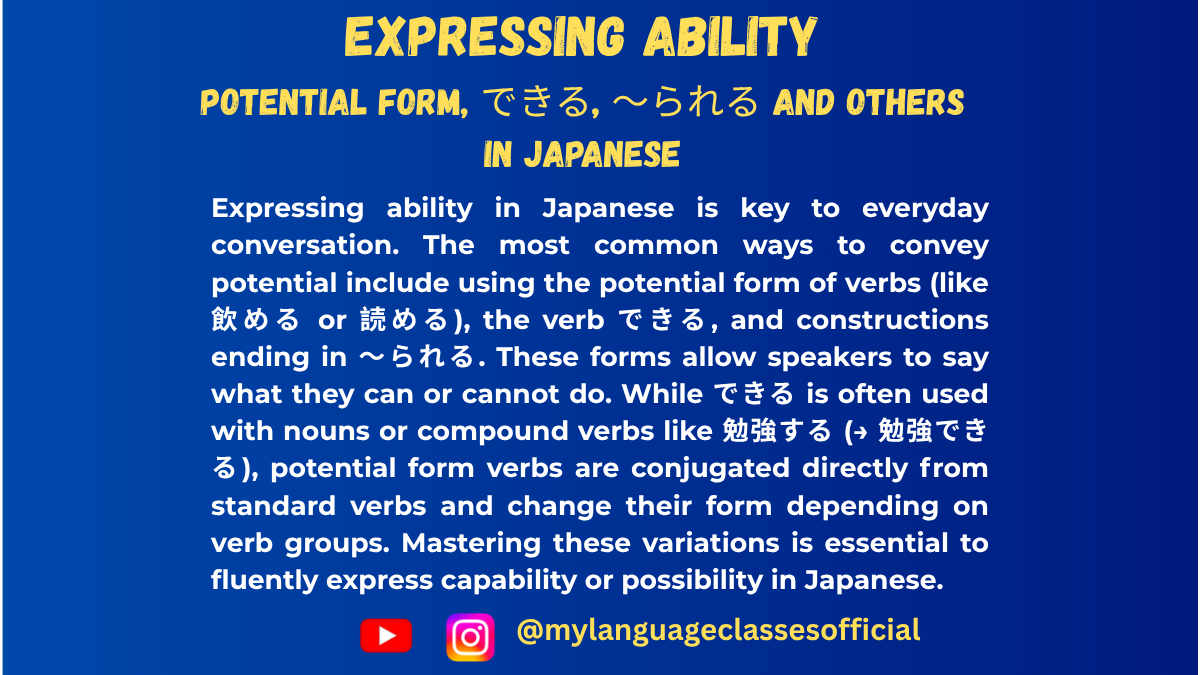
Expressing Ability in Japanese | My Language Classes
How to Express Ability in Japanese
When learning Japanese, expressing ability is an essential skill. Japanese uses specific grammatical structures to indicate whether you can do something. These expressions differ depending on the type of verb, politeness level, and context. This blog post will cover all the patterns and nuances you need to know.
1. Using Potential Form (可能形, Kanoukei)
The potential form of verbs is the most common way to express ability in Japanese. This form modifies the verb to mean “can” or “be able to.”
Formation Rules:
- Group 1 Verbs (五段動詞): Change the last “u” sound to its corresponding “e” sound and add -る.
- 書く (kaku, to write) → 書ける (kakeru, can write)
- 飲む (nomu, to drink) → 飲める (nomeru, can drink)
- Group 2 Verbs (一段動詞): Simply replace -る with -られる.
- 食べる (taberu, to eat) → 食べられる (taberareru, can eat)
- Irregular Verbs:
- する (suru, to do) → できる (dekiru, can do)
- 来る (kuru, to come) → 来られる (korareru, can come)
Usage in Sentences:
- ピアノを弾けますか? (Piano o hikemasu ka?)
Can you play the piano? - 日本語が話せます。 (Nihongo ga hanasemasu.)
I can speak Japanese.
Note: For Group 2 verbs, the shortened form 食べれる is often used in casual speech, but it may be considered grammatically incorrect in formal contexts.
2. Using the Verb できる (Dekiru)
できる is a versatile verb that expresses general ability or possibility. It is often used with nouns or “nominalized verbs” (verbs turned into nouns).
Formation Rules:
- [Noun] + ができる
- スキーができる (Sukī ga dekiru) → I can ski.
- [Verb in dictionary form] + ことができる
- 本を読むことができる (Hon o yomu koto ga dekiru) → I can read books.
Usage in Sentences:
- 私は泳ぐことができません。 (Watashi wa oyogu koto ga dekimasen.)
I cannot swim. - 新しいゲームができる。 (Atarashii geemu ga dekiru.)
I can play a new game.
Tip: Use できる for broader abilities or formal contexts, while the potential form of verbs is more direct.
3. Expressing Inability with できない and Potential Form
The negative forms of できる and potential verbs are used to express inability.
- 書けない (kakenai, cannot write)
- 飲めない (nomenai, cannot drink)
- できない (dekinai, cannot do)
Examples:
- 車を運転できません。 (Kuruma o unten dekimasen.)
I cannot drive a car. - 漢字が読めない。 (Kanji ga yomenai.)
I cannot read kanji.
4. Using Expressions with 〜られる in Daily Conversation
In casual conversation, 〜られる forms often sound softer and less assertive. You can use them to express possibilities or abilities politely.
Examples:
- この本、読めますか? (Kono hon, yomemasu ka?)
Can you read this book? - 外国語は難しいけど、頑張れば話せるよ! (Gaikokugo wa muzukashii kedo, ganbareba hanaseru yo!)
Foreign languages are hard, but you can speak them if you try!
5. Using ~ことがある to Talk About Situational Ability
You can also use ~ことがある to describe situations where something is possible or permissible.
Examples:
- 会議室を使うことができますか? (Kaigishitsu o tsukau koto ga dekimasu ka?)
Is it possible to use the meeting room? - この公園で遊ぶことができます。 (Kono kōen de asobu koto ga dekimasu.)
You can play in this park.
6. Things to Keep in Mind
- Politeness Levels:
Adjust the verb endings according to the situation. For example:- Polite: 話せます (hanasemasu)
- Casual: 話せる (hanaseru)
- Using が vs. を:
When expressing ability, the object marker changes from を to が:- ピアノを弾く → ピアノが弾ける
- Cultural Sensitivity:
Japanese speakers often avoid being overly assertive about their abilities. Phrases like ちょっと難しいです (chotto muzukashii desu, “It’s a bit difficult”) can soften the tone.
7. Practice Sentences for Learners
- 明日、山に登れますか? (Ashita, yama ni noboremasu ka?)
Can you climb the mountain tomorrow? - 子どもの時、泳ぐことができました。 (Kodomo no toki, oyogu koto ga dekimashita.)
When I was a child, I could swim. - 日本語でメールを書けますか? (Nihongo de mēru o kakemasu ka?)
Can you write an email in Japanese?
Expressing ability in Japanese can feel tricky at first, but with practice, it becomes natural. Master these forms, and you’ll be able to communicate your skills and understand others effortlessly!
Have questions or want more examples? Share them in the comments below! 🌸
If you enjoyed this lesson, be sure to check out more posts like this on my blog at My Language Classes. Don’t forget to subscribe my YouTube channel and follow me on Instagram for the latest language learning tips and lessons. Leave a comment below to share your thoughts, or ask any questions you have about nouns.
Happy learning! 😊
- Group 1 Verbs (五段動詞): Change the last “u” sound to its corresponding “e” sound and add -る.
